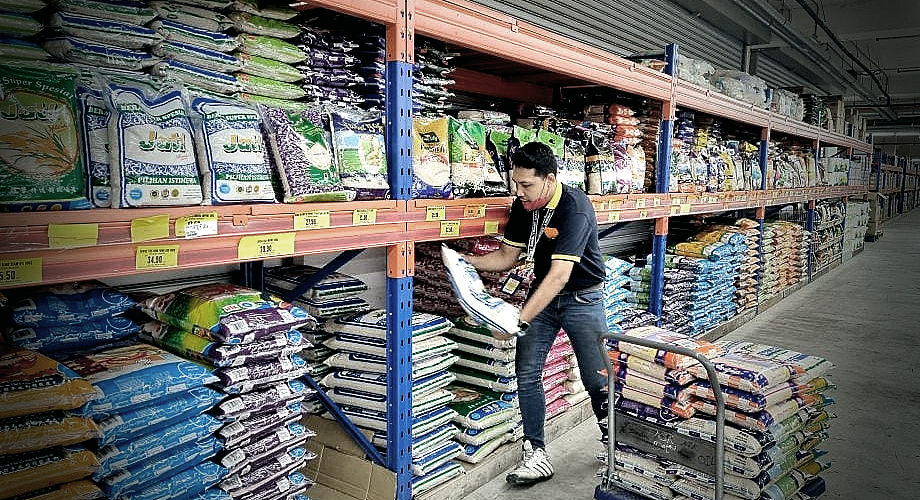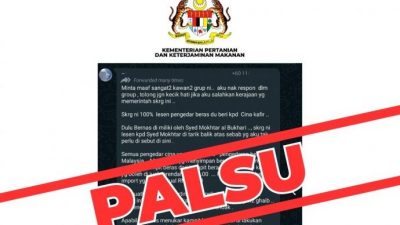To eventually achieve total self-sufficiency and be weaned from import dependence, we will need to install adequate irrigation facilities and implement good planting practices.
Many people may not be aware of the sky-rocketing prices of rice and sugar in the market, thanks to the consequences of climate change, supply chain disruption and geopolitical factors, among others, that have continuously impacted global trade and economy, sending goods prices through the roof.
Last month, India, which accounts for 40% of the world’s rice exports, announced an export ban on non-basmati white rice and broken rice, affecting many rice-importing countries, including Malaysia.
Although some 30% of the country’s rice supply has been imported mainly from Thailand, Vietnam and Pakistan, the Indian ban still deals a significant blow on the local market.
From September 1, Bernas announced that the selling price of white rice would increase from RM2,350 to RM3,200 per tonne with immediate effect.
A 2019 Khazanah Research Institute study showed that Malaysian households spent an average of RM44 on white rice every month, and each Malaysian consumed an average of 80 kg of white rice a year. This amount is set to double if more rice-exporting countries are imposing export bans.
With the price of imported rice up by 36%, wholesale price could increase by that margin.
As the country is practicing free market, the prevailing demand will determine the pricing of commodities. As such, it is hoped that Bernas, the sole rice importer in the country, will ensure adequate supply to meet the local needs so as not to disrupt the market.
Price fluctuations take their cue from the demand-supply situation, consumer preferences as well as how Bernas is going to regulate its procurement strategies, among other things.

Where supply is concerned, Bernas will need to be more transparent in its dealings, allowing the wholesalers to have more precise data to follow up so as not to mess up the rice imports and prices in the market, triggering panic among the consumers.
White rice is a controlled item in Malaysia. If the retail prices are going up too drastically, someone will have to bear the additional cost, either the government or the consumers.
Taking the brunt of the rapidly rising food prices are the low-income families, while the more well-to-do segment of society may have other options.
Anyway, the government must adopt specific measures to help Malaysians weather the issue of fast-rising cost of living.
From the feedback we have collected from major supermarkets in town, the retail prices of imported white rice are bound to go up, forcing consumers to turn to locally produced rice instead.
That said, the supply of local rice has been extremely low in recent months, and many might wonder where the local rice has gone. Could it be some irresponsible traders packaging local rice to sell as imported rice, or the local production has been steadily reduced?
According to Bernas’ official website, domestic production can meet 70% of local needs, and given an adult Malaysian consumes an average of 80 kg of white rice annually, the volume of imports should be around 750,000 metric tonnes each year.
As such, if we do not have sufficient supply, the selling prices could jump exponentially.
The solve this problem, we will need to remarkably increase our rice production. Even if we are blessed with a vast expanse of arable land and resources, our rice production lags far behind may other countries.
We need to implement large-scale cultivation instead of depending on smallholders.
Besides, we must also upgrade our cultivation skills, R&D and development of more productive new variants.
Minister of Agriculture and Food Security Mohamad Sabu has said his ministry would initiate the five yields in two years planting program with Muda Agricultural Development Authority (MADA) this September in hope of boosting the country’s rice production.
This should boost our self-sufficiency to 80% within six years.
Eventually we should be able to achieve total self-sufficiency and do not need to rely on imports any more. But to do this, we must install adequate irrigation facilities and implement good planting practices.
It is time for the Madani government to get down to work!
ADVERTISEMENT
ADVERTISEMENT






































